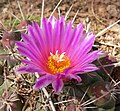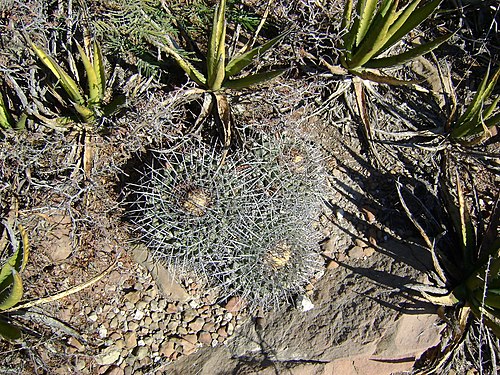Thelocactus rinconensis
| Thelocactus rinconensis | |
|---|---|

| |
| Scientific classification | |
| Kingdom: | Plantae |
| Clade: | Tracheophytes |
| Clade: | Angiosperms |
| Clade: | Eudicots |
| Order: | Caryophyllales |
| Family: | Cactaceae |
| Subfamily: | Cactoideae |
| Genus: | Thelocactus |
| Species: | T. rinconensis
|
| Binomial name | |
| Thelocactus rinconensis | |
| Synonyms[2] | |
| |
Thelocactus rinconensis, synonyms including Thelocactus nidulans, is a species of cactus. It is endemic to north-east Mexico.[2]
Description
[edit]Thelocactus rinconensis is a small perennial gray-green cactus, growing 6 - 8 centimeters high and is between 12 - 20 centimeters in diameter. It has 20-25 ribs with marked with angular tubercles. The areolas are 2 to 2.5 centimeters apart, circular or elliptical and covered with white wooly hairs. Areoles have 3 to 4 central spines are 6 - 8 centimeters long It features up to six dark brown to black main spines and thin, radial spines that are 1.3-1.5 cm long. Flowers, about 4 cm long and 2.5-7.5 cm wide, are funnel-shaped and yellow or whitish, growing from new growth at the top of the plant. Fruits are spherical to oblong with scales, 7-9 mm in diameter, greenish or yellowish. Seeds are 1.7-2 mm long[3]
-
Pink flower cultivar
-
White flower plant
Distribution
[edit]The plant is found in the Chihuahuan Desert of Coahuila and Nuevo Leon, Mexico growing at elevations of 1200-1900 meters growing in xerophytic shrubland on calcareous soils.[4]
-
Plant growing near La Gloria in Nuevo Leon
Taxonomy
[edit]Echinocactus rinconensis was described in The Cactaceae in 1855 by Heinrich Poselger.[5] Nathaniel Lord Britton and Joseph Nelson Rose placed the species in the genus Thelocactus in 1923.[6]
-
Botanical illustration plate from Iconographia Cactacearum
-
Botanical illustration plate from Iconographia Cactacearum
References
[edit]- ^ Gómez-Hinostrosa, C.; Hernández, H.M.; Sotomayor, M.; Smith, M. (2017). "Thelocactus rinconensis". IUCN Red List of Threatened Species. 2017: e.T152644A121602595. doi:10.2305/IUCN.UK.2017-3.RLTS.T152644A121602595.en. Retrieved 13 November 2021.
- ^ a b c "Thelocactus rinconensis (Poselg.) Britton & Rose". Plants of the World Online. Royal Botanic Gardens, Kew. Retrieved 2024-02-20.
- ^ "Find Trees & Learn". University of Arizona Campus Arboretum. Retrieved 2024-05-09.
- ^ "Thelocactus rinconensis". LLIFLE. 2013-08-04. Retrieved 2024-05-09.
 This article incorporates text from this source, which is available under the CC BY-SA 3.0 license.
This article incorporates text from this source, which is available under the CC BY-SA 3.0 license.
- ^ Dietrich, Albert; Otto, Friedrich (1855). "Allgemeine Gartenzeitung". Biodiversity Heritage Library. Retrieved 2024-05-09.
 This article incorporates text from this source, which is available under the CC BY-SA 3.0 license.
This article incorporates text from this source, which is available under the CC BY-SA 3.0 license.
- ^ Britton, Nathaniel Lord; Eaton, Mary E.; Rose, J. N.; Wood, Helen Adelaide (1919). The Cactaceae : descriptions and illustrations of plants of the cactus family. Washington: Carnegie Institution of Washington. doi:10.5962/bhl.title.46288.
- Nathaniel Lord Britton, Joseph Nelson Rose The Cactaceae: Descriptions and Illustrations of Plants of the Cactus family, Volume 3
External links
[edit] Media related to Thelocactus rinconensis at Wikimedia Commons
Media related to Thelocactus rinconensis at Wikimedia Commons Data related to Thelocactus rinconensis at Wikispecies
Data related to Thelocactus rinconensis at Wikispecies








